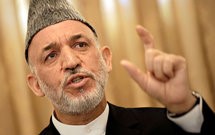 Afghan President Hamid Karzai said Wednesday for the first time that he will step down as president of his country next year. Speaking to reporters in the Indian capital, Karzai said that under no circumstances would he seek to carry his presidency beyond the 2014 expiration of his second term. The Afghan leader explained that he was completely exhausted and didn’t want to be held responsible for his country’s inability to, as he put it, become an institutionalized democracy.
Afghan President Hamid Karzai said Wednesday for the first time that he will step down as president of his country next year. Speaking to reporters in the Indian capital, Karzai said that under no circumstances would he seek to carry his presidency beyond the 2014 expiration of his second term. The Afghan leader explained that he was completely exhausted and didn’t want to be held responsible for his country’s inability to, as he put it, become an institutionalized democracy.
The Afghan leader’s departure is significant for two reasons. First, as the only president the country has had since the United States ended the Taliban's rule some 12 years ago, Karzai has become synonymous with the post-Taliban Afghan regime. Second, he will step down mere months before NATO is due to draw down its forces from the southwest Asian nation.
Afghanistan is far from politically stable, and Karzai's departure raises questions about whether his eventual successor will be able to hold the state together. The concerns are especially poignant when considering the vacuum that will be left by departing NATO troops and the resulting opportunity for Taliban insurgents to undermine the viability of the state created by the West. When asked about efforts to negotiate a settlement with the jihadist movement, Karzai pointed out that a power-sharing arrangement with the Taliban was not possible without the help of Pakistan.
Kabul views Islamabad as a key player in helping achieve a peace settlement with the Afghan Taliban, yet Pakistan itself is not in a position to help, for a couple of reasons. First, Pakistan's struggles with its own domestic Taliban insurgency have undercut Islamabad's ability to mediate between Kabul and the Afghan Taliban. Complicating matters further is the fact that Pakistan finds itself in the throes of a major political transition.
Incoming Pakistani Prime Minister Nawaz Sharif has said that his government would explore avenues to talk to the Pakistani Taliban as a way to end the conflict in his country. Furthermore, Sharif will be looking at major international players to help with the most pressing item on his agenda: economic revival. China ranks high on the list of Pakistan’s foreign allies.
Incidentally, Chinese Premier Li Keqiang is currently visiting Pakistan. His meeting with Sharif comes at a time when China's new leadership is seeking to establish cordial relations through visits with neighbors. The United States' impending withdrawal from Afghanistan has immediate regional consequences that impact China's borders and its interests in neighboring states. This allows China to play a bigger role even as it frees up American strategic resources that can be deployed in the Asia Pacific. Washington's renewed focus on that region has already complicated Beijing's attempt to secure Myanmar as a near-exclusive energy corridor. This makes Pakistan even more valuable as a regional partner and energy transit state, giving Beijing greater impetus to reinvigorate this relationship. While Beijing's diplomacy in South Asia remains multifaceted -- it includes a new push to maintain functional relations with India and develop its links to the subcontinent for trade and logistics -- China has special reasons to cultivate stronger relations with the new Pakistani government.
New leaderships in China, Pakistan and Afghanistan are being established at a time when a Western military drawdown is under way in Afghanistan. Kabul is relying on Islamabad to help shore up its security, while Islamabad is leaning heavily on Beijing to secure its economic wellbeing. The question becomes whether the Chinese can help the Pakistanis in a way that would allow the latter to proffer assistance to the Afghans. It seems clear that Pakistan's problems are too extensive for China's help alone to suffice.
Courtesy : Stratfor (www.stratfor.com)